2022届高考英语二轮复习:定语从句复习课件(31张)
文档属性
| 名称 | 2022届高考英语二轮复习:定语从句复习课件(31张) |
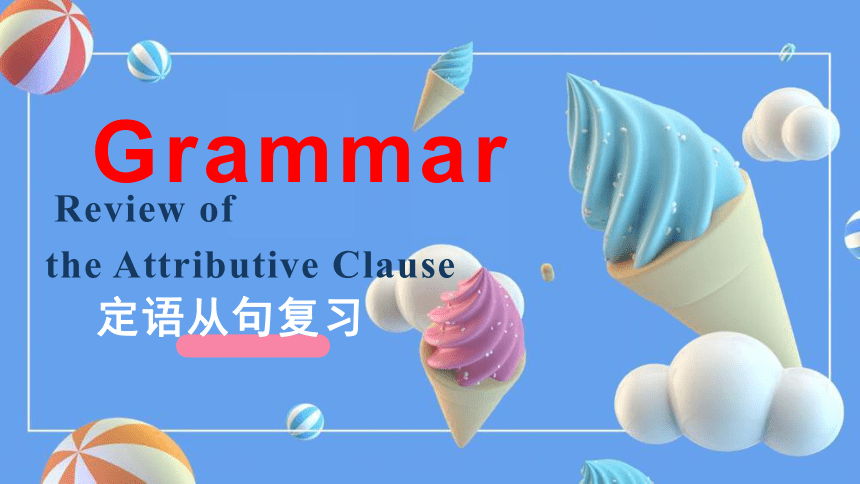
|
|
| 格式 | pptx | ||
| 文件大小 | 481.4KB | ||
| 资源类型 | 教案 | ||
| 版本资源 | 通用版 | ||
| 科目 | 英语 | ||
| 更新时间 | 2022-03-31 00:00:00 | ||
图片预览

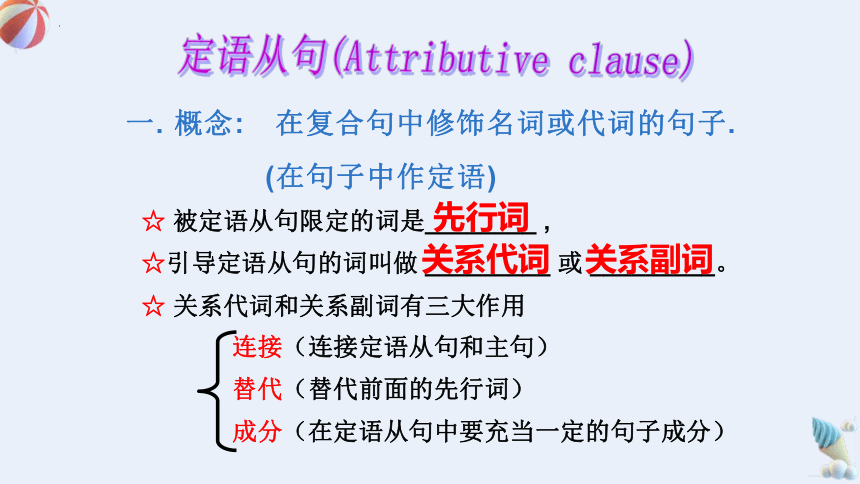
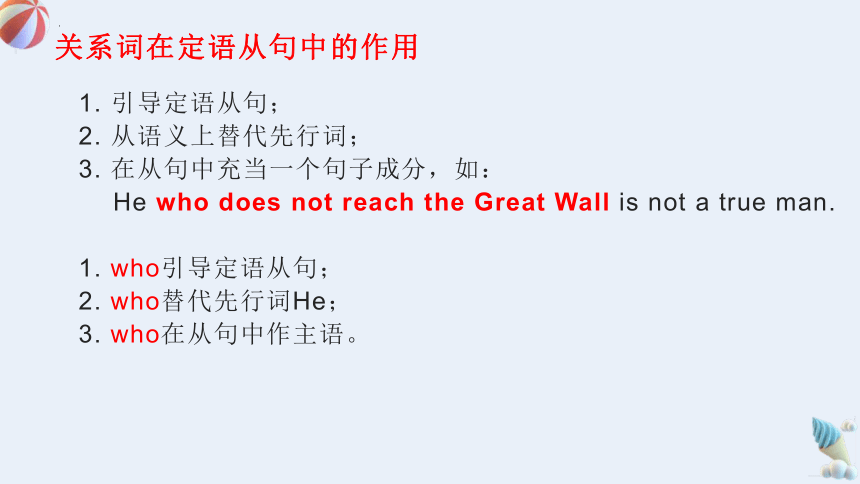
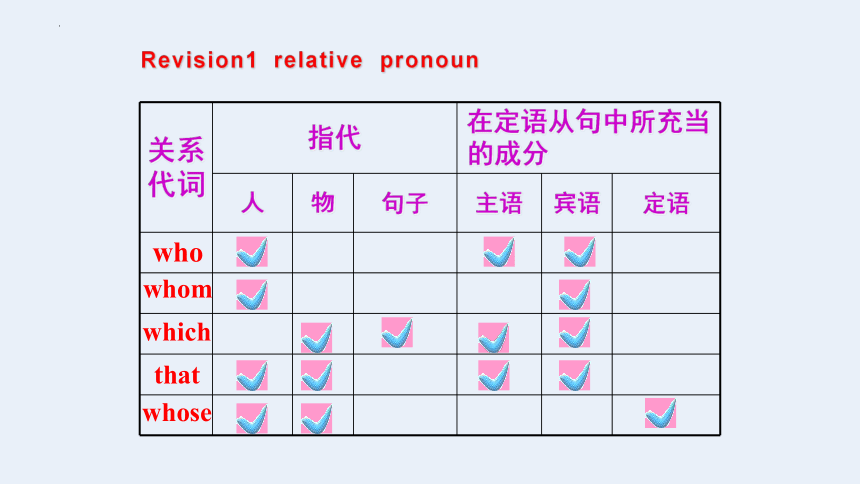
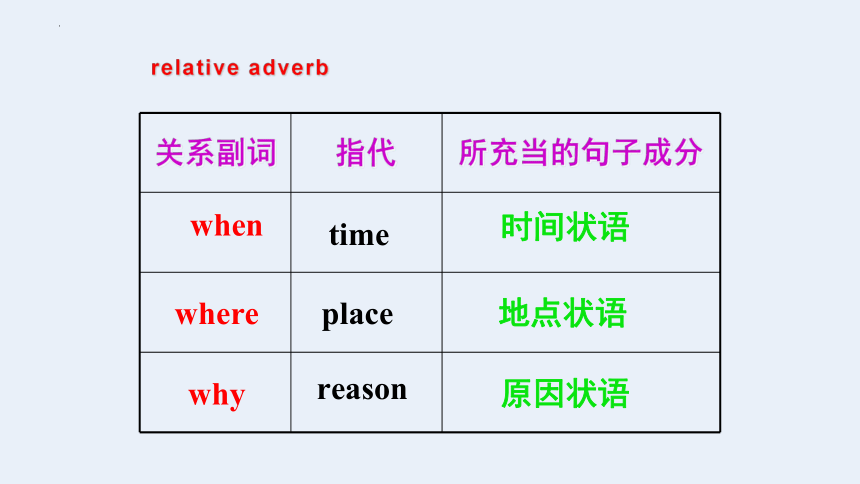
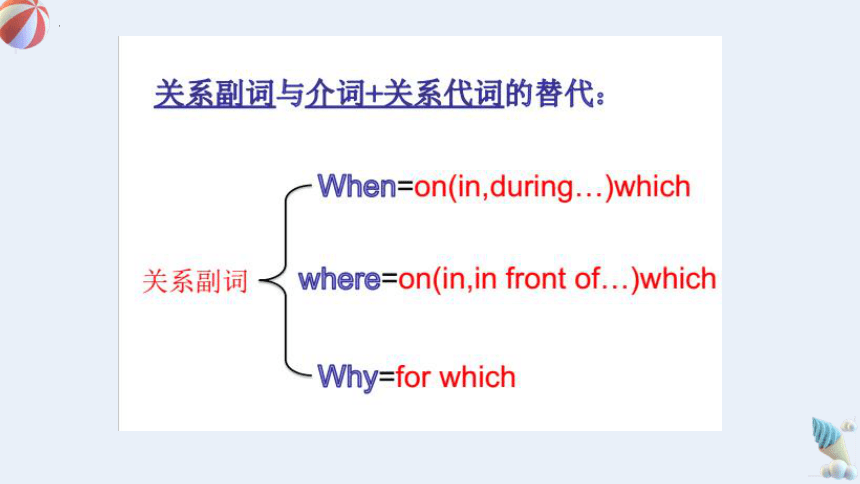
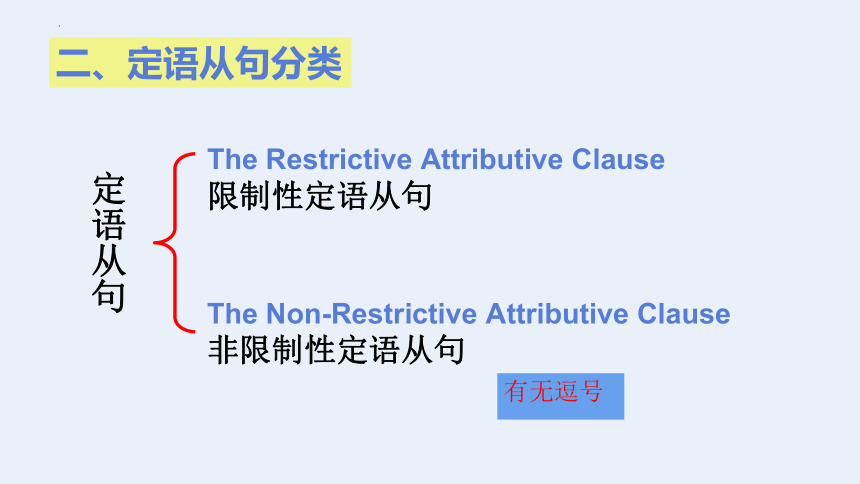
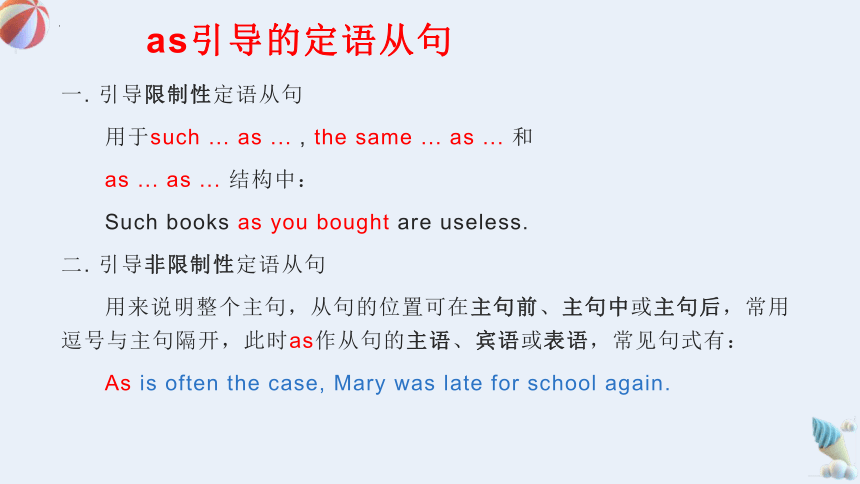
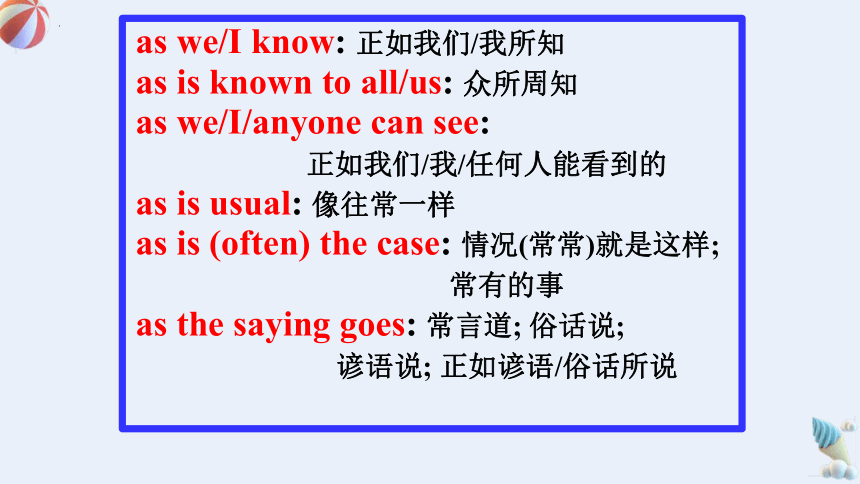
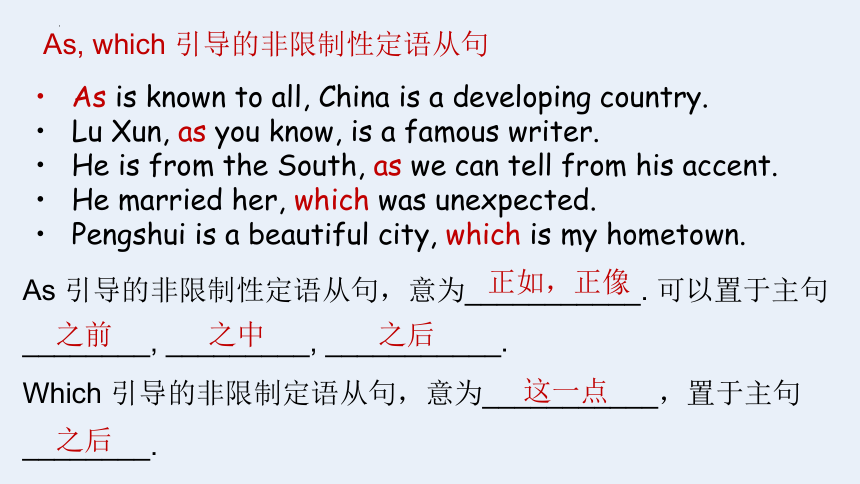
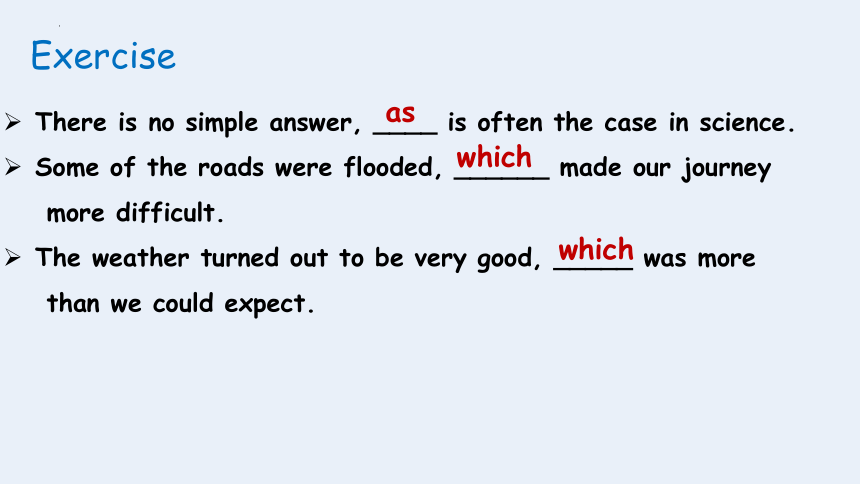
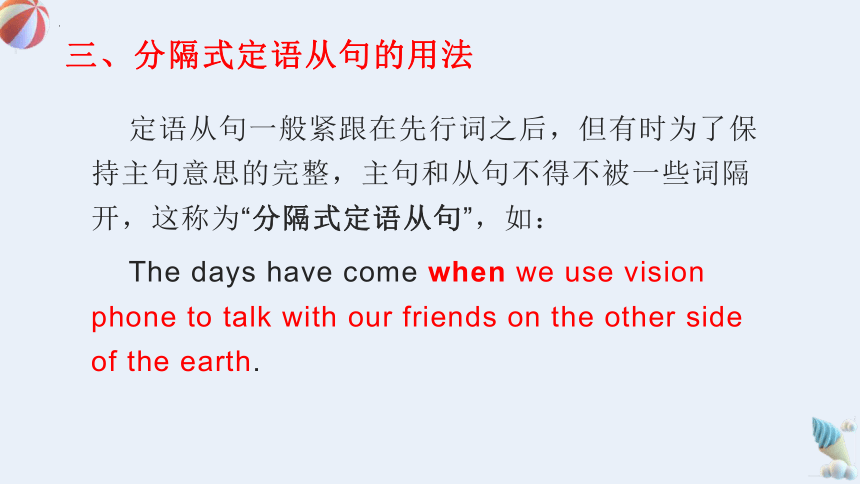
文档简介
(共31张PPT)
Grammar
Review of
the Attributive Clause
定语从句复习
定语从句(Attributive clause)
一. 概念: 在复合句中修饰名词或代词的句子.
(在句子中作定语)
先行词
关系代词
关系副词
连接(连接定语从句和主句)
替代(替代前面的先行词)
成分(在定语从句中要充当一定的句子成分)
☆ 被定语从句限定的词是________ ,
☆引导定语从句的词叫做 _________ 或 _________。
☆ 关系代词和关系副词有三大作用
关系词在定语从句中的作用
1. 引导定语从句;
2. 从语义上替代先行词;
3. 在从句中充当一个句子成分,如:
He who does not reach the Great Wall is not a true man.
1. who引导定语从句;
2. who替代先行词He;
3. who在从句中作主语。
Revision1 relative pronoun
关系代词 指代 在定语从句中所充当的成分 人 物 句子 主语 宾语 定语
who
whom
which
that
whose
relative adverb
关系副词 指代 所充当的句子成分
when
where
why
time
place
reason
时间状语
地点状语
原因状语
定语从句
The Restrictive Attributive Clause
限制性定语从句
The Non-Restrictive Attributive Clause
非限制性定语从句
有无逗号
二、定语从句分类
as引导的定语从句
一. 引导限制性定语从句
用于such ... as ... , the same ... as ... 和
as ... as ... 结构中:
Such books as you bought are useless.
二. 引导非限制性定语从句
用来说明整个主句,从句的位置可在主句前、主句中或主句后,常用逗号与主句隔开,此时as作从句的主语、宾语或表语,常见句式有:
As is often the case, Mary was late for school again.
as we/I know: 正如我们/我所知
as is known to all/us: 众所周知
as we/I/anyone can see:
正如我们/我/任何人能看到的
as is usual: 像往常一样
as is (often) the case: 情况(常常)就是这样;
常有的事
as the saying goes: 常言道; 俗话说;
谚语说; 正如谚语/俗话所说
As, which 引导的非限制性定语从句
As is known to all, China is a developing country.
Lu Xun, as you know, is a famous writer.
He is from the South, as we can tell from his accent.
He married her, which was unexpected.
Pengshui is a beautiful city, which is my hometown.
As 引导的非限制性定语从句,意为___________. 可以置于主句
________, _________, ___________.
Which 引导的非限制定语从句,意为___________,置于主句
________.
正如,正像
之前
之中
之后
这一点
之后
There is no simple answer, ____ is often the case in science.
Some of the roads were flooded, ______ made our journey
more difficult.
The weather turned out to be very good, _____ was more
than we could expect.
Exercise
as
which
which
三、分隔式定语从句的用法
定语从句一般紧跟在先行词之后,但有时为了保持主句意思的完整,主句和从句不得不被一些词隔开,这称为“分隔式定语从句”,如:
The days have come when we use vision phone to talk with our friends on the other side of the earth.
四、定语从句中的特例
1、抽象地点名词后的定语从句
模糊地点名词后常用where引导定语从句,此类词有situation, occasion, point, stage, case, condition等,常译作“情形,情况,处境,程度,地步”,如:
1). I’ve come to the point where I can’t stand him.
2). The country is in the situation where a war will break out at any time.
2、one of +复数名词与the only one of +复数名词作先行词的区别
1). one of +复数名词作先行词,中心词是复数名词,因此其后定语从句的谓语动词用复数形式,如:
English is one of the languages that are widely used in the world.
2). the only one of +复数名词作先行词,中心词是the only one,因此其后定语从句的谓语动词用单数形式,如:
The only one of the students in our class who speaks English after class is Li Hua.
3、只用 that不用which的情况
1). 当先行词为 all, everything, nothing, anything, little, much等
不定代词时;
(1) Tell him everything that you know.
(2) He told us all that he had done.
2). 当先行词被very, both, the only, all, every, no, any, little,
much, some等修饰时;
This is the only English – Chinese dictionary that I have.
3). 当先行词被形容词最高级修饰时;
This is the most beautiful city that I have visited.
4). 当先行词被序数词修饰时;
This is the last lesson that we have this term.
5). 当先行词既包括人又包括物时;
They talked about the teachers and schools that they had visited.
4、只用which不用that引导定语从句的情况
1). 关系代词前有介词且指物时;
This is the room in which Lu Xun lived.
2). 非限制性定语从句中;
He told a lie, which was beyond our expectation.
5、介词+关系代词引导的定语从句
在介词+关系代词(指物用which,指人用whom)引导的定语从句中,介词如何选择:
. 根据从句中动词或形容词的搭配来选择;
. 由先行词的习惯搭配或需要而定;
. 由句子意思来确定。
1). The teacher for ____ you are waiting has come.
A. who B. whom C. that
2).The room in ___ there are many books is mine.
A. that B. who C. which
B
C
6、关系代词、关系副词的省略
1). 关系代词在从句中作宾语或表语时(关系代词前面不能有介词);
The book I'm reading is written by a famous writer. ( 作宾语 )
She is no longer the girl she was 3 years ago. ( 作表语 )
2). 在表方式的“the way”之后的定语从句中,引导词用that或in which,或者常省略;
The way you speak to your parents is not very polite.
定语从句易错易混点讲解
一、先行词表示地点或时间时,关系词的误判。
1.This is the house _________he lived last year.
2.This is the house _________he visited last year.
3.I thought of the happy days ___________I stayed in Beijing.
4.I have never forgotten the day __________we spent together.
5. The film brought the hours back to me __________I was taken good care of in that far-away village.
where
which
when
which
when
二、误将强调句型当定语从句。
1. It is the house _________ he was born.
2. It is in the house ________ he was born.
3. It is from this library _________I borrowed the book.
where
that
that
三、定语从句与并列句的混淆。
1. Mr. White has three sons, all of ________ are brave.
2. Mr. White has three sons, and all of________ are brave.
3. Mr. White has three sons; all of _________ are brave.
4. Mr. White has three sons, all of ________ brave.
whom
them
them
them
四、as引导的非限定性从句和what引导的主语从句以及it做形式主语时的主语从句的混淆。
1. _______ is known to us all, China is a developing country.
2._______ is known to us all is that China is a developing country.
3._______ is known to us all that China is developing country.
As
what
It
五、that引导的限制性定语从句与同位语从句的区别。
1. We don’t believe in the news _______ he told us yesterday.
2. He told us the news_________ our team had won the game.
which/that
that
定语从句与同位语从句的区别
定语从句与同位语从句的区别
一. 定语从句和前面的名词是修饰与被修饰的关系;而同位语从句是对前面中心词内容的说明,从句和前面的名词是同一件事,是同位关系;
二. 定语从句的引导词必须在从句中充当句子成分,去掉句子就不完整; 而同位语从句的引导词that只起引导作用,去掉并不影响句子的完整性,如:
The news that he told me was exciting.(定语从句)
The news that we'll have a get - together with some college students was exciting. (同位语从句)
三. 引导词在从句中做不做成分是关键。
六、定语从句中主谓要一致
(1) This is one of the rooms that ________ (be)damaged in the fire.
This is the only one of the rooms that _______ (be)damaged in the fire.
(2)The university in France that I am applying for _______(have) its own requirement.
were
was
has
纠正以下各句中的错误。
1.Some of the boys I invited them didn’t come.
2.The book that you need it is in the library.
3. Anyone who break the law will be punished.
4. Those who has finished may go home.
5. He is the only one of the teachers who know French in our school.
6. English is a language shared by several diverse cultures,each of which use it
differently.
7. Children eat a lot of sugar often have bad teeth.
8. That evening, when I will tell you more about later, I ended up
working very late.
9.The exact year when Angela and her family spent together in
China was 2008.
10. I still remember the day on when I first came to Beijing.
11. Is this book that your teacher gave you yesterday
12. When we got home, we went to the store where sold us the GPS.
breaks
have
knows
uses
eat前加 who
which
which
which
book前加the
which
高考链接
与 君 共 勉
He laughs best who laughs last.
谁笑在最后, 谁笑得最好。
He that gains time gains all things.
谁赢得时间,谁就赢得一切。
All is not gold that glitters.
闪闪发光者,未必皆黄金。
He that travels far knows much.
行万里者,见多识广。
Thank you !
Grammar
Review of
the Attributive Clause
定语从句复习
定语从句(Attributive clause)
一. 概念: 在复合句中修饰名词或代词的句子.
(在句子中作定语)
先行词
关系代词
关系副词
连接(连接定语从句和主句)
替代(替代前面的先行词)
成分(在定语从句中要充当一定的句子成分)
☆ 被定语从句限定的词是________ ,
☆引导定语从句的词叫做 _________ 或 _________。
☆ 关系代词和关系副词有三大作用
关系词在定语从句中的作用
1. 引导定语从句;
2. 从语义上替代先行词;
3. 在从句中充当一个句子成分,如:
He who does not reach the Great Wall is not a true man.
1. who引导定语从句;
2. who替代先行词He;
3. who在从句中作主语。
Revision1 relative pronoun
关系代词 指代 在定语从句中所充当的成分 人 物 句子 主语 宾语 定语
who
whom
which
that
whose
relative adverb
关系副词 指代 所充当的句子成分
when
where
why
time
place
reason
时间状语
地点状语
原因状语
定语从句
The Restrictive Attributive Clause
限制性定语从句
The Non-Restrictive Attributive Clause
非限制性定语从句
有无逗号
二、定语从句分类
as引导的定语从句
一. 引导限制性定语从句
用于such ... as ... , the same ... as ... 和
as ... as ... 结构中:
Such books as you bought are useless.
二. 引导非限制性定语从句
用来说明整个主句,从句的位置可在主句前、主句中或主句后,常用逗号与主句隔开,此时as作从句的主语、宾语或表语,常见句式有:
As is often the case, Mary was late for school again.
as we/I know: 正如我们/我所知
as is known to all/us: 众所周知
as we/I/anyone can see:
正如我们/我/任何人能看到的
as is usual: 像往常一样
as is (often) the case: 情况(常常)就是这样;
常有的事
as the saying goes: 常言道; 俗话说;
谚语说; 正如谚语/俗话所说
As, which 引导的非限制性定语从句
As is known to all, China is a developing country.
Lu Xun, as you know, is a famous writer.
He is from the South, as we can tell from his accent.
He married her, which was unexpected.
Pengshui is a beautiful city, which is my hometown.
As 引导的非限制性定语从句,意为___________. 可以置于主句
________, _________, ___________.
Which 引导的非限制定语从句,意为___________,置于主句
________.
正如,正像
之前
之中
之后
这一点
之后
There is no simple answer, ____ is often the case in science.
Some of the roads were flooded, ______ made our journey
more difficult.
The weather turned out to be very good, _____ was more
than we could expect.
Exercise
as
which
which
三、分隔式定语从句的用法
定语从句一般紧跟在先行词之后,但有时为了保持主句意思的完整,主句和从句不得不被一些词隔开,这称为“分隔式定语从句”,如:
The days have come when we use vision phone to talk with our friends on the other side of the earth.
四、定语从句中的特例
1、抽象地点名词后的定语从句
模糊地点名词后常用where引导定语从句,此类词有situation, occasion, point, stage, case, condition等,常译作“情形,情况,处境,程度,地步”,如:
1). I’ve come to the point where I can’t stand him.
2). The country is in the situation where a war will break out at any time.
2、one of +复数名词与the only one of +复数名词作先行词的区别
1). one of +复数名词作先行词,中心词是复数名词,因此其后定语从句的谓语动词用复数形式,如:
English is one of the languages that are widely used in the world.
2). the only one of +复数名词作先行词,中心词是the only one,因此其后定语从句的谓语动词用单数形式,如:
The only one of the students in our class who speaks English after class is Li Hua.
3、只用 that不用which的情况
1). 当先行词为 all, everything, nothing, anything, little, much等
不定代词时;
(1) Tell him everything that you know.
(2) He told us all that he had done.
2). 当先行词被very, both, the only, all, every, no, any, little,
much, some等修饰时;
This is the only English – Chinese dictionary that I have.
3). 当先行词被形容词最高级修饰时;
This is the most beautiful city that I have visited.
4). 当先行词被序数词修饰时;
This is the last lesson that we have this term.
5). 当先行词既包括人又包括物时;
They talked about the teachers and schools that they had visited.
4、只用which不用that引导定语从句的情况
1). 关系代词前有介词且指物时;
This is the room in which Lu Xun lived.
2). 非限制性定语从句中;
He told a lie, which was beyond our expectation.
5、介词+关系代词引导的定语从句
在介词+关系代词(指物用which,指人用whom)引导的定语从句中,介词如何选择:
. 根据从句中动词或形容词的搭配来选择;
. 由先行词的习惯搭配或需要而定;
. 由句子意思来确定。
1). The teacher for ____ you are waiting has come.
A. who B. whom C. that
2).The room in ___ there are many books is mine.
A. that B. who C. which
B
C
6、关系代词、关系副词的省略
1). 关系代词在从句中作宾语或表语时(关系代词前面不能有介词);
The book I'm reading is written by a famous writer. ( 作宾语 )
She is no longer the girl she was 3 years ago. ( 作表语 )
2). 在表方式的“the way”之后的定语从句中,引导词用that或in which,或者常省略;
The way you speak to your parents is not very polite.
定语从句易错易混点讲解
一、先行词表示地点或时间时,关系词的误判。
1.This is the house _________he lived last year.
2.This is the house _________he visited last year.
3.I thought of the happy days ___________I stayed in Beijing.
4.I have never forgotten the day __________we spent together.
5. The film brought the hours back to me __________I was taken good care of in that far-away village.
where
which
when
which
when
二、误将强调句型当定语从句。
1. It is the house _________ he was born.
2. It is in the house ________ he was born.
3. It is from this library _________I borrowed the book.
where
that
that
三、定语从句与并列句的混淆。
1. Mr. White has three sons, all of ________ are brave.
2. Mr. White has three sons, and all of________ are brave.
3. Mr. White has three sons; all of _________ are brave.
4. Mr. White has three sons, all of ________ brave.
whom
them
them
them
四、as引导的非限定性从句和what引导的主语从句以及it做形式主语时的主语从句的混淆。
1. _______ is known to us all, China is a developing country.
2._______ is known to us all is that China is a developing country.
3._______ is known to us all that China is developing country.
As
what
It
五、that引导的限制性定语从句与同位语从句的区别。
1. We don’t believe in the news _______ he told us yesterday.
2. He told us the news_________ our team had won the game.
which/that
that
定语从句与同位语从句的区别
定语从句与同位语从句的区别
一. 定语从句和前面的名词是修饰与被修饰的关系;而同位语从句是对前面中心词内容的说明,从句和前面的名词是同一件事,是同位关系;
二. 定语从句的引导词必须在从句中充当句子成分,去掉句子就不完整; 而同位语从句的引导词that只起引导作用,去掉并不影响句子的完整性,如:
The news that he told me was exciting.(定语从句)
The news that we'll have a get - together with some college students was exciting. (同位语从句)
三. 引导词在从句中做不做成分是关键。
六、定语从句中主谓要一致
(1) This is one of the rooms that ________ (be)damaged in the fire.
This is the only one of the rooms that _______ (be)damaged in the fire.
(2)The university in France that I am applying for _______(have) its own requirement.
were
was
has
纠正以下各句中的错误。
1.Some of the boys I invited them didn’t come.
2.The book that you need it is in the library.
3. Anyone who break the law will be punished.
4. Those who has finished may go home.
5. He is the only one of the teachers who know French in our school.
6. English is a language shared by several diverse cultures,each of which use it
differently.
7. Children eat a lot of sugar often have bad teeth.
8. That evening, when I will tell you more about later, I ended up
working very late.
9.The exact year when Angela and her family spent together in
China was 2008.
10. I still remember the day on when I first came to Beijing.
11. Is this book that your teacher gave you yesterday
12. When we got home, we went to the store where sold us the GPS.
breaks
have
knows
uses
eat前加 who
which
which
which
book前加the
which
高考链接
与 君 共 勉
He laughs best who laughs last.
谁笑在最后, 谁笑得最好。
He that gains time gains all things.
谁赢得时间,谁就赢得一切。
All is not gold that glitters.
闪闪发光者,未必皆黄金。
He that travels far knows much.
行万里者,见多识广。
Thank you !
